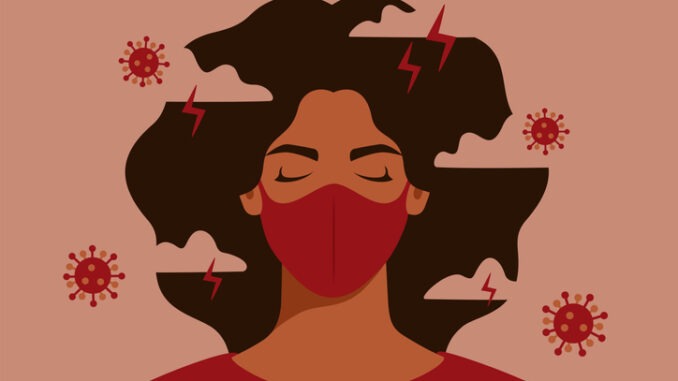
Charlotte Augst, CEO of National Voices, explains why decision-makers should apply the insights learnt from people living with chronic illness in order to collectively manage COVID
CREDIT: This is an edited version of an article that originally appeared on The BMJ
Currently six million people are waiting to see a specialist, GP surgeries are texting their patients asking them not to call the surgery unless urgent, and home visits to those relying on domiciliary care are limited due to staff shortages.
All eyes are on acute medicine – and on ambulances queuing outside the emergency department. The question on decision-makers’ minds seems to be, ‘Will we scrape through this crisis without further mitigation? Can acute medicine stem the tide of infections that we are doing so little to control?’
If our health and care system were a person with a long-term condition we would say that they are ‘poorly controlled’. If someone living with asthma or depression lurched from hospital admission to hospital admission, from preventable crisis to preventable crisis – without ever trying to manage their condition – we’d say they weren’t coping.
The members of National Voices – over 190 health and care charities supporting a diverse range of health conditions and communities – know what people living with chronic ill health need and want. What would it look like to apply this hard-won knowledge, based on lived experience, to how we need to learn to live with COVID, collectively?
If COVID is here to stay, we could do a lot worse than to listen to the many people our members’ support. They can show us how to maintain enjoyable, productive, independent lives, despite it all. Everyone living with chronic ill health or disability knows that it is better to prevent a crisis than to treat it. This is why we use medicines to control blood sugar or depression. This is why we gently move to relieve sore joints. This is why we develop and document routines to manage dementia.
If decision-makers applied this insight to collectively managing COVID, then the first question would not be, ‘Do we have enough critical care beds?’ Instead we would ask, ‘What can we do to prevent people catching the virus in the first place?’
Bringing balance
Like individuals building a life around a chronic condition, we collectively need to balance clinical concerns with our need to have a life outside of health; this is why it is so damaging to pretend that those who argue for stronger mitigations are demanding constant lockdowns. There is a lot we can do that enables us to both to have a life and reduce risks – wear masks, ventilate schools and indoors spaces, move activities outdoors.
Everyone living with chronic ill health, or a disability, also knows that, sadly, not every crisis can be prevented – so, people make plans. Plans for prevention, but also for what needs to happen when things take a turn for the worse. Together with their care teams, people document what they want and need and who will do what to make things go according to that plan.
We don’t seem to have applied this learning to the second winter peak of COVID. We celebrated so-called ‘Freedom Day’, we harangued people to go back to the office, we insisted how terrible it was to wear a mask in school – but we did not plan for what we would do if infections took off again. There is no discernible plan for schools. There is no discernible workforce plan. There is no published plan for recovery. There is something called a ‘plan for supporting primary care access’ – but it obsesses about league tables for digital consultations, so it is a plan that misses the point. We are lurching from crisis to crisis because we have not planned for, and resourced, a health and care system that can actively support people to stay well.
Pressing concerns
Health professionals often assume that all that people living with ill health need is more and better medicine; as someone whose family member was given a life-changing diagnosis, I can confirm that this is simply not the case. The first concrete worry that kept me awake at night after the shock and trauma of terminal cancer was not about drugs and treatments; it was about my ability to pay the mortgage, followed by the emotional needs of the children, work and loneliness. Imagine my life had also been shaped by disadvantage, discrimination, poverty, or racism; the concerns that need to be addressed would be even more pressing.
This is why National Voices’ members focus so much on non-clinical support—because peer support, providing information, financial advice and practical help are what makes a massive difference.
Again, we have failed to apply this learning to what we need to do to allow all of us to live better with this virus. We still have one the lowest levels of statutory sick pay in Europe. We still have not sorted accessible help for people on low wages to repeatedly self-isolate. There is no plan for people who are clinically vulnerable, or have caught long COVID, to be protected from job loss. Our communication of expectations and rules has been patchy at best, and pitiful at worst – and there is still no BSL interpreter standing alongside our prime minister in Downing Street.
So here is my prescription for the next year. Create an advisory council of people who live with ill health and disability, who know how to manage its impact on their lives, how to prevent, plan, and think holistically. Insist that the cabinet listen to the people who know what it takes as they discuss Plan B, ‘riding things out’ and whether the NHS is ‘coping’.
Together, let’s develop a plan for the year to come that weans us off our addiction to crisis medicine and centres on the fundamentals of good chronic conditions care.

Be the first to comment